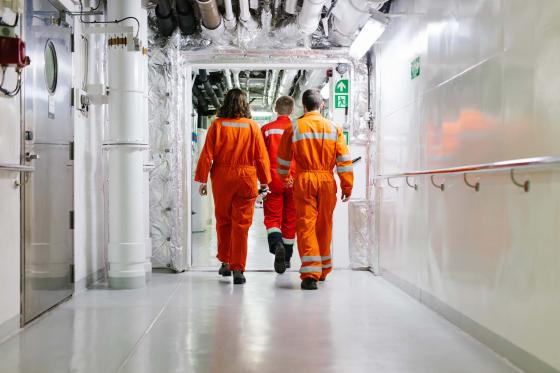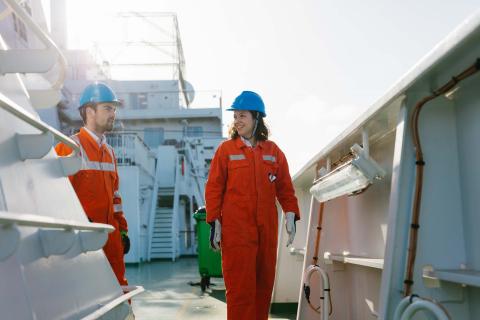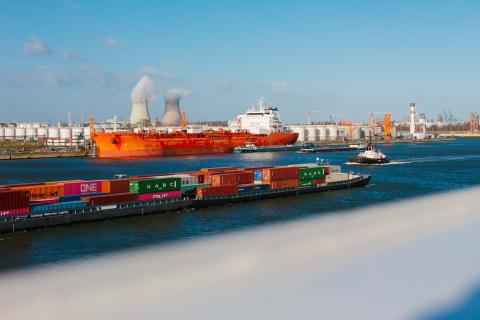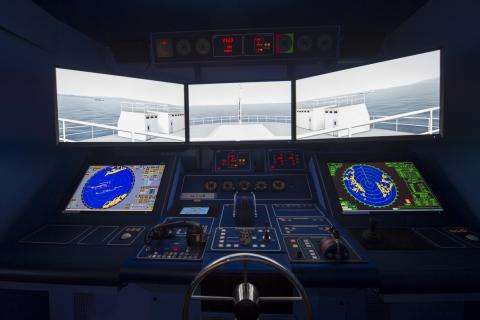Research
Research at the Antwerp Maritime Academy is interdisciplinary. In addition to the obvious maritime practical experience, AMA actively seeks out networks in national and international networks. The research is practice-oriented, arising from concrete questions within the educational and/or professional practice and strives for multidisciplinary solutions that are applicable/usable within that same practice.

Overview
Research at the Antwerp Maritime Academy is based on interdisciplinary questions and approaches. The AMA exploits this interdisciplinary character: in addition to the obvious maritime practical experience in national and international networks, AMA actively seeks out such networks. This research can be practice-oriented or applied in nature. Practice-oriented research arises from concrete questions within educational and/or professional practice and strives for multidisciplinary solutions that are applicable/usable within that same practice. Applied research starts from fundamental scientific knowledge and uses this knowledge in real examples and situations.
Practice-oriented research is fully-fledged research that meets all academic traditions and requirements, but is closely related to practical questions from the field. In both cases, the researcher relies on academic thinking and working methods: a correct experimental setup, a statistical approach to data, design engineering, objective surveying and starting from a clear research question formulated according to the SMART principle. For the AMA, however, academisation is not a process in which we abandon this practical approach, but one in which we strengthen our research methodological approach and deepen the insights we have gained. In terms of content, AMA's research currently focuses mainly on four areas of expertise: (1) the fight against corrosion and fouling, (2) sustainable maritime transport, (3) maritime health and (4) maritime cybersecurity. These four areas of expertise are closely intertwined with the two existing training programmes and are continuously reinforced by research conducted on the basis of concrete questions and needs from practice. The research is also carried out in collaboration with business partners. Examples include research with companies on smart maintenance of engines, detection of corrosion in maritime industrial installations, the use of alternative carbon-neutral fuel types for inland shipping, etc.
How?
The Structural Decree in Belgium provides professional bachelor's degrees on the one hand and academic bachelor's and master's degrees on the other hand. The AMA's Nautical Sciences programme consists of a three-year academic bachelor's degree followed by a one-year master's degree. Since the 2021-2022 academic year, the Marine Engineering programme has also become an academic programme (Bachelor's and Master's). This requires the same accreditation as that of the universities. In order to obtain the necessary support in this academisation process, the AMA is part of the AUHA (Association of Universities and Colleges of Antwerp). In 2003, the University of Antwerp made funds available for the first time from its own Special Research Fund (BOF) for scientific research to support the academisation of the association's colleges.
To finance the AMA's scientific projects, there are various subsidy channels that our researchers can use:
- In collaboration with the University of Antwerp, there are the BOF-academisation projects.
- In the professional bachelor's programme in Marine Engineering, research is currently supported through funds for project-based scientific research (PWO research project).
- Within the AMA, it is possible to start internal research projects with funding from our own research resources and/or tax recovery.
- The European Commission also makes funds available for projects (European Research Projects within the Horizon and Interreg programmes).
An overview of current projects shows how these funds are being used in ongoing research.
In addition, the Antwerp Maritime Academy offers the opportunity to obtain a PhD in Nautical Sciences. This degree is awarded in collaboration with the University of Antwerp.
Onderzoeksgroepen
Inhoudelijk richt het onderzoek van de Antwerp Maritime Academy zich momenteel voornamelijk op vier expertisegebieden: (1) de strijd tegen corrosie en fouling, (2) duurzaam maritiem transport, (3) maritieme gezondheid en (4) maritieme cybersecurity. Deze vier expertisegebieden zijn nauw verweven met de twee bestaande opleidingsprogramma's en worden voortdurend versterkt door onderzoek dat wordt uitgevoerd op basis van concrete vragen en behoeften uit de praktijk.

Amacort
AMACORT (Antwerp Maritime Academy CORrosion Team) works on topics regarding maritime corrosion, corrosion modelling and antifouling technology.
Lees meer

Sustainable transport
The Sustainable Transport research group specializes in the impact that ships have on our well-being, health and environment. We are building expertise on air quality in and around ships, measures that improve air quality, but also on preventive maintenance of engines and energy management, among other things.
Lees meer
Onderzoeksprojecten
De verschillende onderzoeksprojecten zijn onderverdeeld in voltooide projecten en lopende projecten. Neem gerust een kijkje naar wat het onderzoeksteam van de Antwerp Maritime Academy al heeft bereikt en waar ze momenteel aan werken.


